# Templates - 동적으로 변수를 넘기는 또다른 방법
Airflow에서는 템플릿 문법을 통해 Airflow에서 제공하는 기본 템플릿 변수를 사용하거나 이를 조작할 수 있습니다.
템플릿 문법을 활용하는 여러 예시를 살펴봅시다. 예시가 좀 길어서 Overview부터 시작하여 하나씩 살펴보겠습니다.
# Overview
# Grpah View
다음과 같은 Task들을 가지는 DAG을 작성할 것입니다.
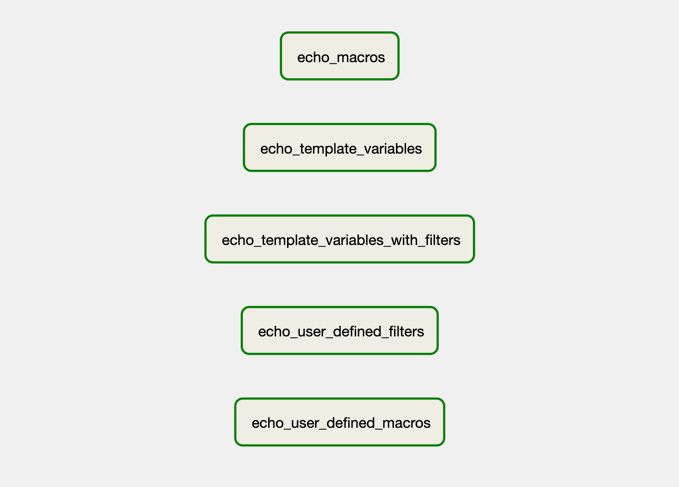
Task 간 의존성은 없습니다. 각 Task 별로 어떻게 템플릿 문법을 활용하는지 하나씩 살펴보겠습니다.
# Code
전체 코드는 다음과 같습니다.
from datetime import datetime
from airflow import DAG
from airflow.operators.bash import BashOperator
from pendulum.tz.timezone import Timezone
def create_message() -> str:
return "hello airflow"
def get_first_element(string: str) -> str:
return string.split()[0]
with DAG(
dag_id="04_templates",
description="Templates를 활용하는 DAG 예제입니다.",
default_args={
"owner": "heumsi",
"retries": 0,
},
start_date=datetime(2022, 1, 20, tzinfo=Timezone("Asia/Seoul")),
schedule_interval="@daily",
tags=["examples", "05_etc_features"],
catchup=False, # 가장 최근에 스케쥴된 Dag Run만 실행합니다.
user_defined_macros={"author": "heumsi", "create_message": create_message},
user_defined_filters={"get_first_element": get_first_element},
) as dag:
task_1 = BashOperator(
task_id="echo_template_variables",
bash_command="""
echo {{ dag_run.logical_date }} && \
echo {{ data_interval_start }} && \
echo {{ data_interval_end }}
""",
)
task_2 = BashOperator(
task_id="echo_template_variables_with_filters",
bash_command="""
echo {{ dag_run.logical_date | ds }} && \
echo {{ data_interval_start | ds_nodash }} && \
echo {{ data_interval_end | ts }}
""",
)
task_3 = BashOperator(
task_id="echo_macros",
bash_command="""
echo {{ macros.datetime.now() }} && \
echo {{ macros.ds_add(dag_run.logical_date | ds , 5) }}
""",
)
task_4 = BashOperator(
task_id="echo_user_defined_macros",
bash_command="""
echo {{ author }} && \
echo {{ create_message() }}
""",
)
task_5 = BashOperator(
task_id="echo_user_defined_filters",
bash_command="""
echo {{ 'welcome airflow' | get_first_element }}
""",
)
2
3
4
5
6
7
8
9
10
11
12
13
14
15
16
17
18
19
20
21
22
23
24
25
26
27
28
29
30
31
32
33
34
35
36
37
38
39
40
41
42
43
44
45
46
47
48
49
50
51
52
53
54
55
56
57
58
59
60
61
62
63
64
65
66
67
68
69
70
task_1 부터 task_5 까지 각 Task를 하나씩 살펴봅시다.
# Pre Defined Variables
템플릿 변수로 Airflow에서 기본적으로 제공해주는 변수들을 사용할 수 있습니다.
# Code
from datetime import datetime
from airflow import DAG
from airflow.operators.bash import BashOperator
from pendulum.tz.timezone import Timezone
def create_message() -> str:
return "hello airflow"
def get_first_element(string: str) -> str:
return string.split()[0]
with DAG(
dag_id="04_templates",
description="Templates를 활용하는 DAG 예제입니다.",
default_args={
"owner": "heumsi",
"retries": 0,
},
start_date=datetime(2022, 1, 20, tzinfo=Timezone("Asia/Seoul")),
schedule_interval="@daily",
tags=["examples", "05_etc_features"],
catchup=False, # 가장 최근에 스케쥴된 Dag Run만 실행합니다.
user_defined_macros={"author": "heumsi", "create_message": create_message},
user_defined_filters={"get_first_element": get_first_element},
) as dag:
task_1 = BashOperator(
task_id="echo_template_variables",
bash_command="""
echo {{ dag_run.logical_date }} && \
echo {{ data_interval_start }} && \
echo {{ data_interval_end }}
""",
)
task_2 = BashOperator(
task_id="echo_template_variables_with_filters",
bash_command="""
echo {{ dag_run.logical_date | ds }} && \
echo {{ data_interval_start | ds_nodash }} && \
echo {{ data_interval_end | ts }}
""",
)
task_3 = BashOperator(
task_id="echo_macros",
bash_command="""
echo {{ macros.datetime.now() }} && \
echo {{ macros.ds_add(dag_run.logical_date | ds , 5) }}
""",
)
task_4 = BashOperator(
task_id="echo_user_defined_macros",
bash_command="""
echo {{ author }} && \
echo {{ create_message() }}
""",
)
task_5 = BashOperator(
task_id="echo_user_defined_filters",
bash_command="""
echo {{ 'welcome airflow' | get_first_element }}
""",
)
2
3
4
5
6
7
8
9
10
11
12
13
14
15
16
17
18
19
20
21
22
23
24
25
26
27
28
29
30
31
32
33
34
35
36
37
38
39
40
41
42
43
44
45
46
47
48
49
50
51
52
53
54
55
56
57
58
59
60
61
62
63
64
65
66
67
68
69
70
dag_run,data_interval_start,data_interval_end모두 Airflow가 제공해주는 기본 템플릿 변수입니다.dag_run은 DAG Run에 대한 정보를 담은 인스턴스입니다.logical_date은 Task Instance가 (스케줄링으로) 실행되는 시간입니다.logical_date은 2.2.0 이전 버전에서는execution_date로 불렸습니다.
data_interval_start은 작업의 스케줄 간격의 시작 시간입니다.data_interval_end는 작업의 스케줄 간격의 종료 시간입니다.
TIP
실행 시간, 스케줄 간격 시작, 종료 시간의 개념이 충분히 헷갈릴 수 있습니다. 헷갈리시는 분은 이 글 (opens new window)을 읽어보시길 추천드립니다.
# Log
이 Task Instance의 실행 로그입니다.
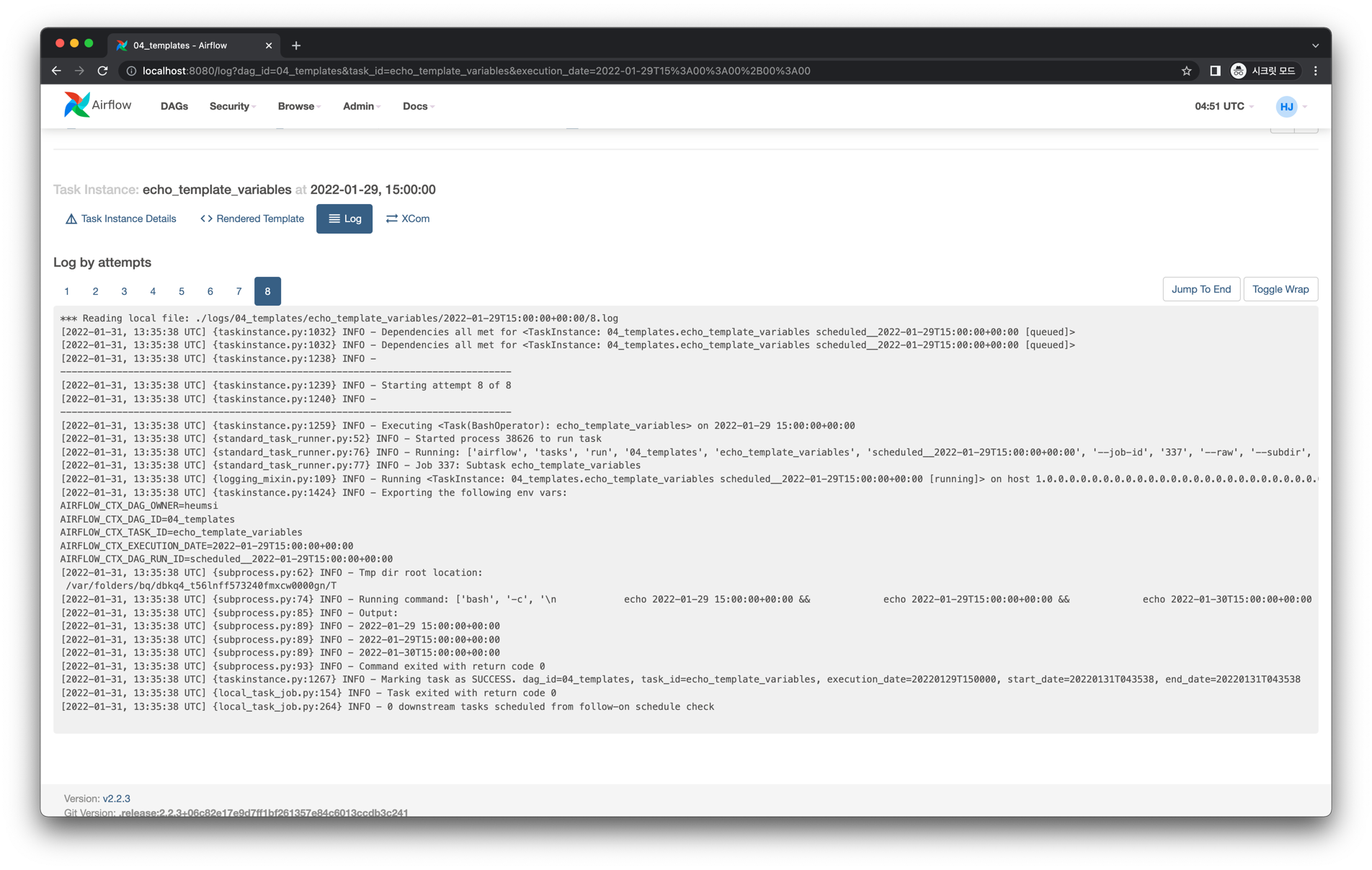
각 템플릿 변수 값이 다음처럼 출력된 것을 볼 수 있습니다.
dag_run.logical_datedata_interval_startdata_interval_end
[2022-01-31, 13:35:38 UTC] {subprocess.py:89} INFO - 2022-01-29 15:00:00+00:00
[2022-01-31, 13:35:38 UTC] {subprocess.py:89} INFO - 2022-01-29T15:00:00+00:00
[2022-01-31, 13:35:38 UTC] {subprocess.py:89} INFO - 2022-01-30T15:00:00+00:00
2
3
TIP
Airflow에 미리 정의된 모든 변수는 공식 문서 (opens new window)에서 확인하실 수 있습니다.
# Pre Defined Filters
템플릿 변수와 더불어 Airflow에서 기본적으로 제공해주는 Filter들을 다음처럼 사용할 수 있습니다.
# Code
from datetime import datetime
from airflow import DAG
from airflow.operators.bash import BashOperator
from pendulum.tz.timezone import Timezone
def create_message() -> str:
return "hello airflow"
def get_first_element(string: str) -> str:
return string.split()[0]
with DAG(
dag_id="04_templates",
description="Templates를 활용하는 DAG 예제입니다.",
default_args={
"owner": "heumsi",
"retries": 0,
},
start_date=datetime(2022, 1, 20, tzinfo=Timezone("Asia/Seoul")),
schedule_interval="@daily",
tags=["examples", "05_etc_features"],
catchup=False, # 가장 최근에 스케쥴된 Dag Run만 실행합니다.
user_defined_macros={"author": "heumsi", "create_message": create_message},
user_defined_filters={"get_first_element": get_first_element},
) as dag:
task_1 = BashOperator(
task_id="echo_template_variables",
bash_command="""
echo {{ dag_run.logical_date }} && \
echo {{ data_interval_start }} && \
echo {{ data_interval_end }}
""",
)
task_2 = BashOperator(
task_id="echo_template_variables_with_filters",
bash_command="""
echo {{ dag_run.logical_date | ds }} && \
echo {{ data_interval_start | ds_nodash }} && \
echo {{ data_interval_end | ts }}
""",
)
task_3 = BashOperator(
task_id="echo_macros",
bash_command="""
echo {{ macros.datetime.now() }} && \
echo {{ macros.ds_add(dag_run.logical_date | ds , 5) }}
""",
)
task_4 = BashOperator(
task_id="echo_user_defined_macros",
bash_command="""
echo {{ author }} && \
echo {{ create_message() }}
""",
)
task_5 = BashOperator(
task_id="echo_user_defined_filters",
bash_command="""
echo {{ 'welcome airflow' | get_first_element }}
""",
)
2
3
4
5
6
7
8
9
10
11
12
13
14
15
16
17
18
19
20
21
22
23
24
25
26
27
28
29
30
31
32
33
34
35
36
37
38
39
40
41
42
43
44
45
46
47
48
49
50
51
52
53
54
55
56
57
58
59
60
61
62
63
64
65
66
67
68
69
70
- 템플릿 변수 뒤에 파이프
|와 함께 Filter를 적용합니다.ds는 시간(datetime)에서 날짜만을 추출합니다.ds_nodash는ds와 동일하게 날짜만을 추출한 뒤-를 삭제합니다.ts는 시간(datetime)을2018-01-01T00:00:00+00:00와 같은 형태로 변환합니다.
# Log
이 Task Instance의 실행 로그입니다.
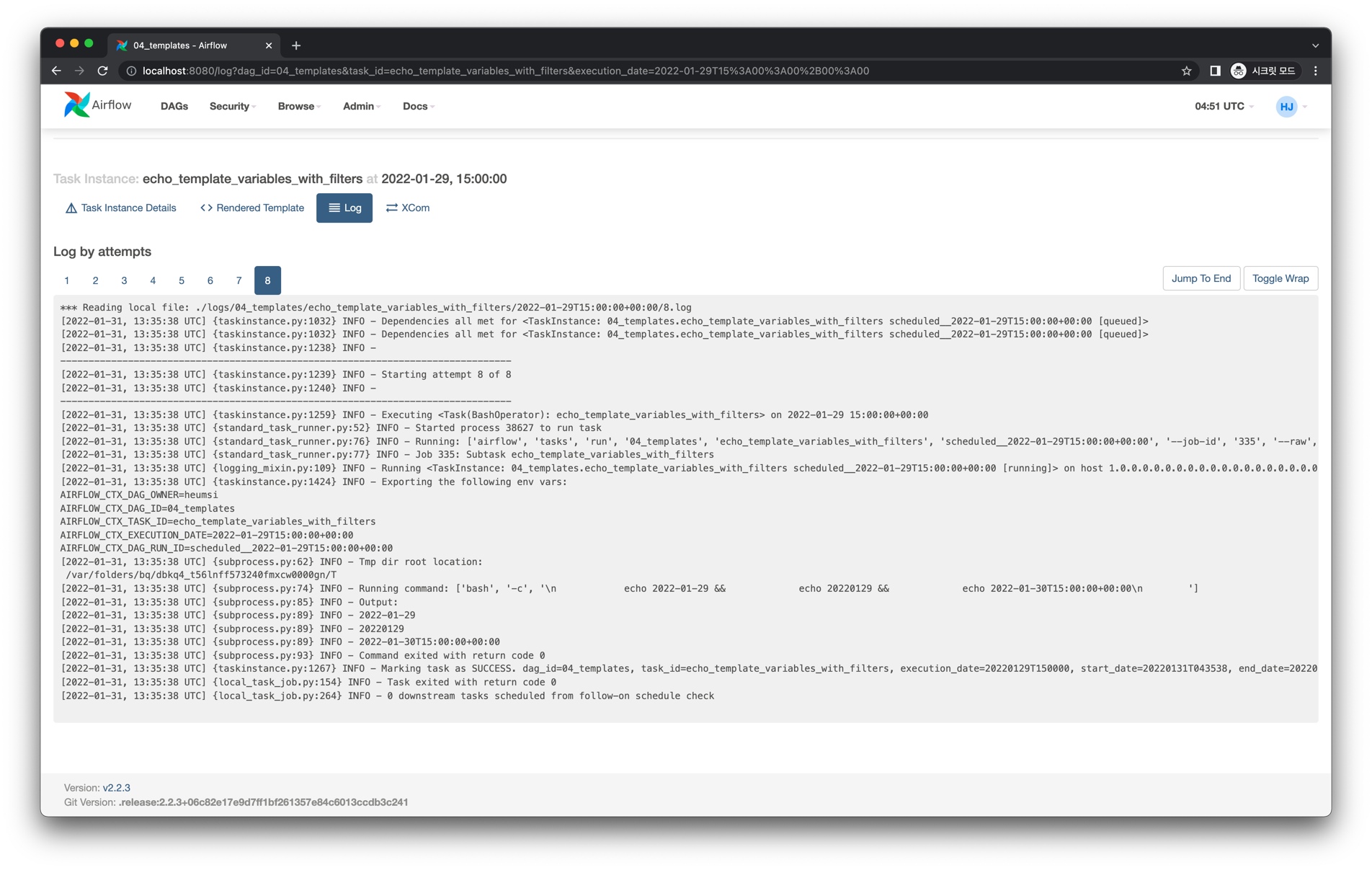
각 템플릿 변수 값이 다음처럼 출력된 것을 볼 수 있습니다.
dag_run.logical_date | dsdata_interval_start | ds_nodashdata_interval_end | ts
[2022-01-31, 13:35:38 UTC] {subprocess.py:89} INFO - 2022-01-29
[2022-01-31, 13:35:38 UTC] {subprocess.py:89} INFO - 20220129
[2022-01-31, 13:35:38 UTC] {subprocess.py:89} INFO - 2022-01-30T15:00:00+00:00
2
3
TIP
Airflow에 미리 정의된 모든 Filter는 공식 문서 (opens new window)에서 확인하실 수 있습니다.
# Macros
macros (opens new window) 패키지 내에서 정의한 함수들은 다음처럼 템플릿 문법에서 가져다 사용할 수 있습니다.
# Code
from datetime import datetime
from airflow import DAG
from airflow.operators.bash import BashOperator
from pendulum.tz.timezone import Timezone
def create_message() -> str:
return "hello airflow"
def get_first_element(string: str) -> str:
return string.split()[0]
with DAG(
dag_id="04_templates",
description="Templates를 활용하는 DAG 예제입니다.",
default_args={
"owner": "heumsi",
"retries": 0,
},
start_date=datetime(2022, 1, 20, tzinfo=Timezone("Asia/Seoul")),
schedule_interval="@daily",
tags=["examples", "05_etc_features"],
catchup=False, # 가장 최근에 스케쥴된 Dag Run만 실행합니다.
user_defined_macros={"author": "heumsi", "create_message": create_message},
user_defined_filters={"get_first_element": get_first_element},
) as dag:
task_1 = BashOperator(
task_id="echo_template_variables",
bash_command="""
echo {{ dag_run.logical_date }} && \
echo {{ data_interval_start }} && \
echo {{ data_interval_end }}
""",
)
task_2 = BashOperator(
task_id="echo_template_variables_with_filters",
bash_command="""
echo {{ dag_run.logical_date | ds }} && \
echo {{ data_interval_start | ds_nodash }} && \
echo {{ data_interval_end | ts }}
""",
)
task_3 = BashOperator(
task_id="echo_macros",
bash_command="""
echo {{ macros.datetime.now() }} && \
echo {{ macros.ds_add(dag_run.logical_date | ds , 5) }}
""",
)
task_4 = BashOperator(
task_id="echo_user_defined_macros",
bash_command="""
echo {{ author }} && \
echo {{ create_message() }}
""",
)
task_5 = BashOperator(
task_id="echo_user_defined_filters",
bash_command="""
echo {{ 'welcome airflow' | get_first_element }}
""",
)
2
3
4
5
6
7
8
9
10
11
12
13
14
15
16
17
18
19
20
21
22
23
24
25
26
27
28
29
30
31
32
33
34
35
36
37
38
39
40
41
42
43
44
45
46
47
48
49
50
51
52
53
54
55
56
57
58
59
60
61
62
63
64
65
66
67
68
69
70
datetime과ds_add은 macro 패키지 내에 기본적으로 포함되어 있습니다.datetime.now()는 실행 시간 기준 시간(datetime)을 반환합니다.ds_add(ds: str, days: int)는YYYY-MM-DD형태로 된 문자열ds에days값 만큼 일수를 더한 문자열을 반환합니다.
# Log
이 Task Instance의 실행 로그입니다.
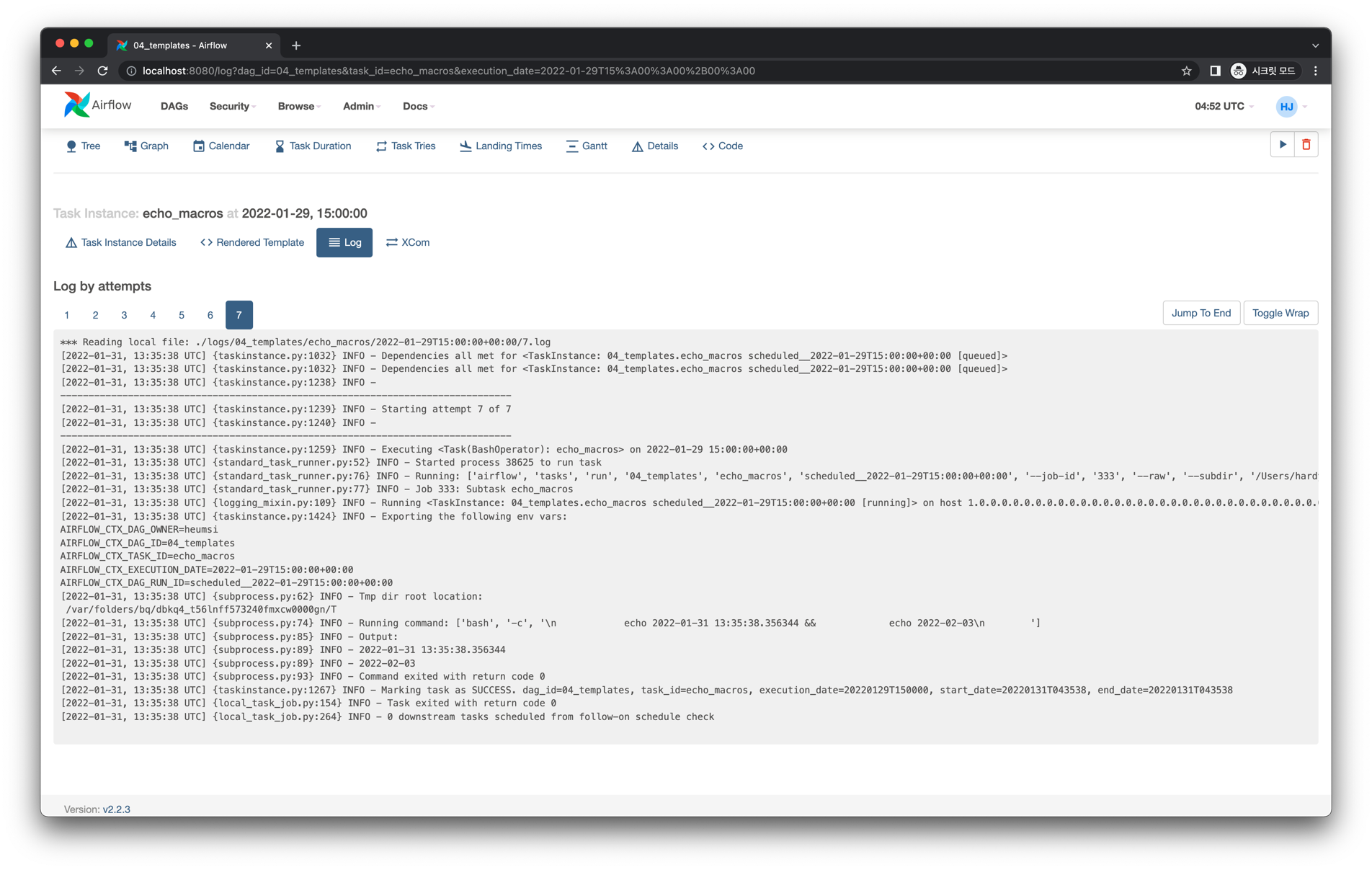
각 템플릿 변수 값이 다음처럼 출력된 것을 볼 수 있습니다.
macros.datetime.now()macros.ds_add(dag_run.logical_date | ds , 5)
[2022-01-31, 13:35:38 UTC] {subprocess.py:89} INFO - 2022-01-31 13:35:38.356344
[2022-01-31, 13:35:38 UTC] {subprocess.py:89} INFO - 2022-02-03
2
TIP
Airflow에 미리 정의된 모든 Macro는 공식 문서 (opens new window)에서 확인하실 수 있습니다.
# User Defined Macros
다음처럼 작성자가 직접 Macro를 정의할 수 있습니다.
# Code
from datetime import datetime
from airflow import DAG
from airflow.operators.bash import BashOperator
from pendulum.tz.timezone import Timezone
def create_message() -> str:
return "hello airflow"
def get_first_element(string: str) -> str:
return string.split()[0]
with DAG(
dag_id="04_templates",
description="Templates를 활용하는 DAG 예제입니다.",
default_args={
"owner": "heumsi",
"retries": 0,
},
start_date=datetime(2022, 1, 20, tzinfo=Timezone("Asia/Seoul")),
schedule_interval="@daily",
tags=["examples", "05_etc_features"],
catchup=False, # 가장 최근에 스케쥴된 Dag Run만 실행합니다.
user_defined_macros={"author": "heumsi", "create_message": create_message},
user_defined_filters={"get_first_element": get_first_element},
) as dag:
task_1 = BashOperator(
task_id="echo_template_variables",
bash_command="""
echo {{ dag_run.logical_date }} && \
echo {{ data_interval_start }} && \
echo {{ data_interval_end }}
""",
)
task_2 = BashOperator(
task_id="echo_template_variables_with_filters",
bash_command="""
echo {{ dag_run.logical_date | ds }} && \
echo {{ data_interval_start | ds_nodash }} && \
echo {{ data_interval_end | ts }}
""",
)
task_3 = BashOperator(
task_id="echo_macros",
bash_command="""
echo {{ macros.datetime.now() }} && \
echo {{ macros.ds_add(dag_run.logical_date | ds , 5) }}
""",
)
task_4 = BashOperator(
task_id="echo_user_defined_macros",
bash_command="""
echo {{ author }} && \
echo {{ create_message() }}
""",
)
task_5 = BashOperator(
task_id="echo_user_defined_filters",
bash_command="""
echo {{ 'welcome airflow' | get_first_element }}
""",
)
2
3
4
5
6
7
8
9
10
11
12
13
14
15
16
17
18
19
20
21
22
23
24
25
26
27
28
29
30
31
32
33
34
35
36
37
38
39
40
41
42
43
44
45
46
47
48
49
50
51
52
53
54
55
56
57
58
59
60
61
62
63
64
65
66
67
68
69
70
8-9번 라인에 Macro로 사용할 함수 혹은 변수를 정의합니다.27번 라인에Dict로 Macro로 사용할 함수 혹은 변수를 매핑합니다.Dict의 Key가 Macro에서 사용할 값이고, Value가 실제로 사용할 변수나 함수가 됩니다.
60-61번 라인에 직접 정의한 Macro를 사용합니다.
# Log
이 Task Instance의 실행 로그입니다.
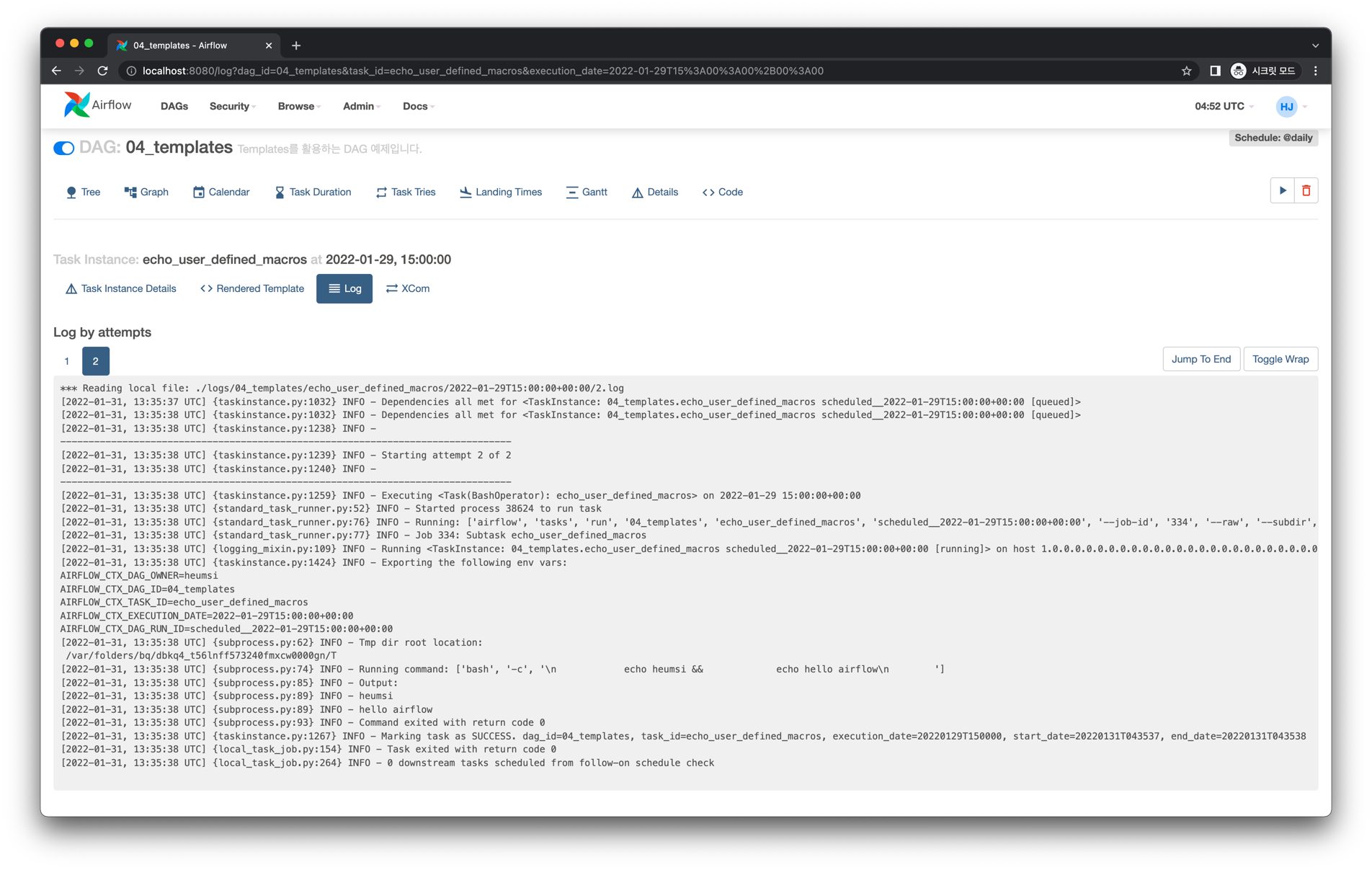
각 템플릿 변수 값이 다음처럼 출력된 것을 볼 수 있습니다.
authorcreate_message()
[2022-01-31, 13:35:38 UTC] {subprocess.py:89} INFO - heumsi
[2022-01-31, 13:35:38 UTC] {subprocess.py:89} INFO - hello airflow
2
# User Defined Filters
다음처럼 작성자가 직접 Filter를 정의할 수 있습니다.
# Code
from datetime import datetime
from airflow import DAG
from airflow.operators.bash import BashOperator
from pendulum.tz.timezone import Timezone
def create_message() -> str:
return "hello airflow"
def get_first_element(string: str) -> str:
return string.split()[0]
with DAG(
dag_id="04_templates",
description="Templates를 활용하는 DAG 예제입니다.",
default_args={
"owner": "heumsi",
"retries": 0,
},
start_date=datetime(2022, 1, 20, tzinfo=Timezone("Asia/Seoul")),
schedule_interval="@daily",
tags=["examples", "05_etc_features"],
catchup=False, # 가장 최근에 스케쥴된 Dag Run만 실행합니다.
user_defined_macros={"author": "heumsi", "create_message": create_message},
user_defined_filters={"get_first_element": get_first_element},
) as dag:
task_1 = BashOperator(
task_id="echo_template_variables",
bash_command="""
echo {{ dag_run.logical_date }} && \
echo {{ data_interval_start }} && \
echo {{ data_interval_end }}
""",
)
task_2 = BashOperator(
task_id="echo_template_variables_with_filters",
bash_command="""
echo {{ dag_run.logical_date | ds }} && \
echo {{ data_interval_start | ds_nodash }} && \
echo {{ data_interval_end | ts }}
""",
)
task_3 = BashOperator(
task_id="echo_macros",
bash_command="""
echo {{ macros.datetime.now() }} && \
echo {{ macros.ds_add(dag_run.logical_date | ds , 5) }}
""",
)
task_4 = BashOperator(
task_id="echo_user_defined_macros",
bash_command="""
echo {{ author }} && \
echo {{ create_message() }}
""",
)
task_5 = BashOperator(
task_id="echo_user_defined_filters",
bash_command="""
echo {{ 'welcome airflow' | get_first_element }}
""",
)
2
3
4
5
6
7
8
9
10
11
12
13
14
15
16
17
18
19
20
21
22
23
24
25
26
27
28
29
30
31
32
33
34
35
36
37
38
39
40
41
42
43
44
45
46
47
48
49
50
51
52
53
54
55
56
57
58
59
60
61
62
63
64
65
66
67
68
69
70
12-13번 라인에 Filter로 사용할 함수를 정의합니다.28번 라인에Dict로 Filter로 사용할 함수를 매핑합니다.Dict의 Key가 Macro에서 사용할 값이고, Value가 실제로 사용할 함수가 됩니다.
65-70번 라인에 직접 정의한 Filter를 사용합니다.
# Log
이 Task Instance의 실행 로그입니다.
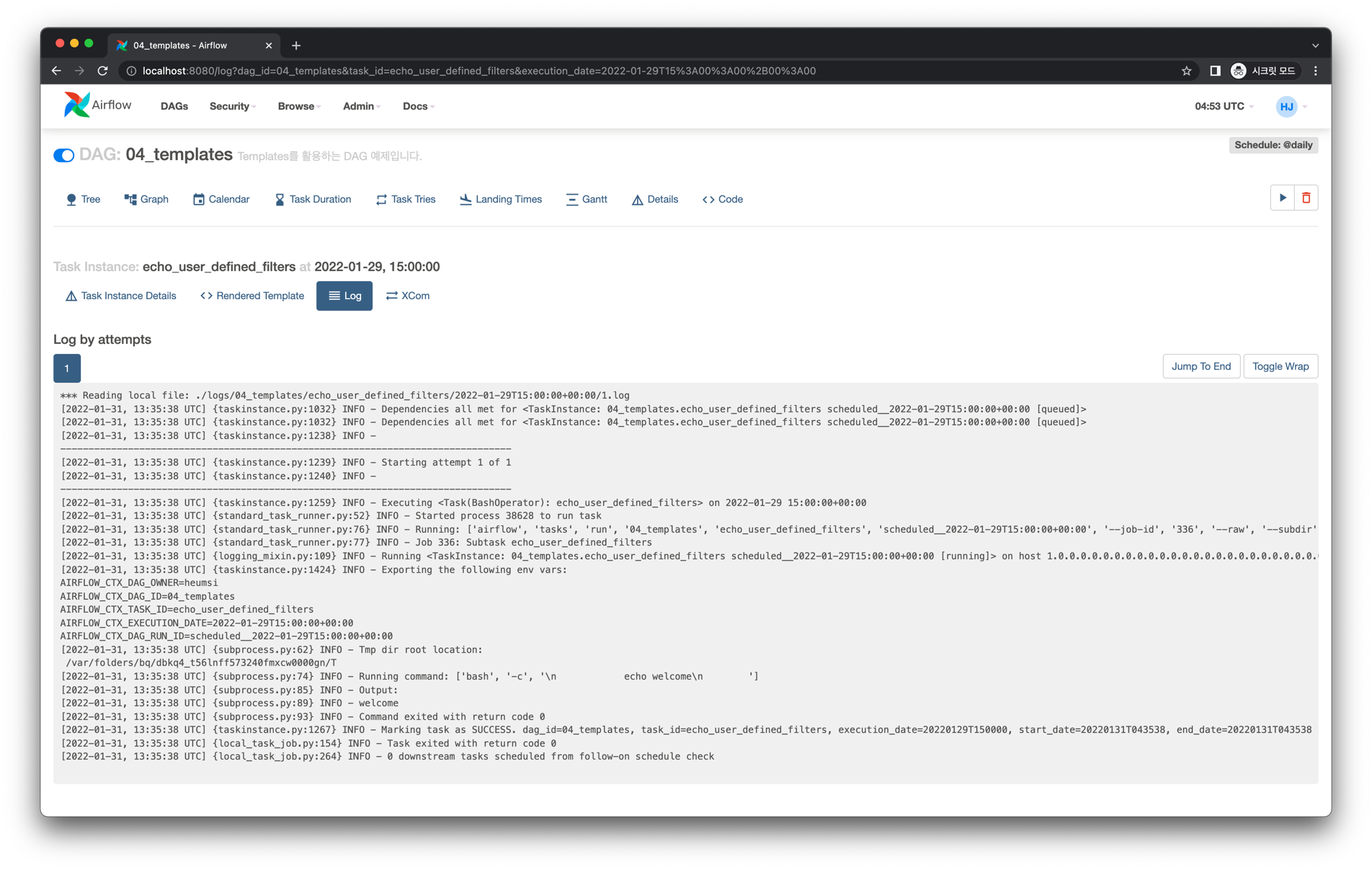
템플릿 변수 값이 다음처럼 출력된 것을 볼 수 있습니다.
'welcome airflow' | get_first_element
[2022-01-31, 13:35:38 UTC] {subprocess.py:89} INFO - welcome
TIP
일반적으로 Operator에 Template 변수를 넘기는 방법은 Custom Operator 페이지를 참고하세요.
